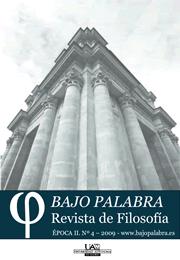Palabras clave:
Palabras clave: ideal, identidad, identificación, inconsciente, político Keywords: ideal, identification, identity, unconscious, politicalDerechos de autor 2009 L. S. González de Araújo

Esta obra está bajo una licencia internacional Creative Commons Atribución 4.0.
Resumen
La presente comunicación tiene por objeto retomar el estudio del mutuo inferir de lo político y lo inconsciente en la sociedad actual, a través del análisis de lo que llamaremos el complejo I, tejido compuesto por los conceptos ideal, identidad e identificación. Sirviéndonos de parte de los aparatos teóricos de Lacan y Deleuze, se mostrará cómo el sujeto (en su inexpugnable performatividad y dependencia del Otro/otro social) se halla determinado por innumerables trazos de identificación colectiva autorizados por aquel que ocupa la posición de ideal en el sistema de producción-reproducción social y activados sobre el “acolchamiento” de los distintos significantes que configuran las significaciones imaginarias sociales dominantes y modelan los procesos de identidad. Con todo ello, se intentará mostrar el modo en que tales mecanismos se ven alterados progresivamente por la axiomática propia del capitalismo y cómo las respectivas formaciones de lo inconsciente y lo político (en sus múltiples articulaciones discursivas) han derivado en una triple crisis de esta red ideal-identificación-identidad que conduce a la expropiación de lo común de la comunidad misma y a la consiguiente alienación del sujeto en su propia forma de desear.
